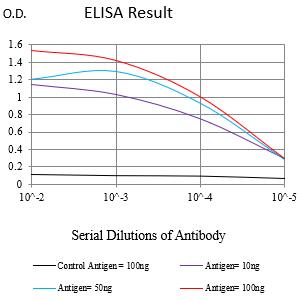
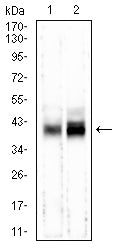
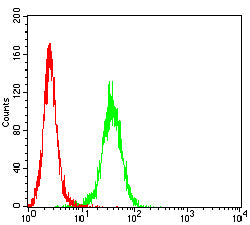
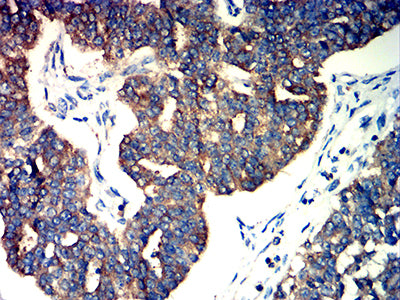
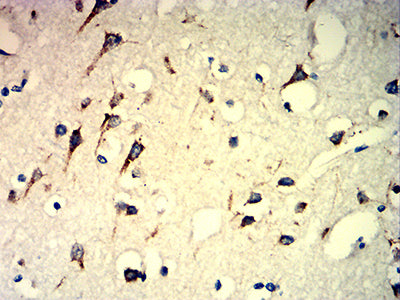
| WB | 咨询技术 | Transfected |
| IF | 咨询技术 | Transfected |
| IHC | 咨询技术 | Transfected |
| ICC | 技术咨询 | Transfected |
| FCM | 咨询技术 | Transfected |
| Elisa | 咨询技术 | Transfected |
| Aliases | SMPR; MPR46; CD-MPR; MPR 46; MPR-46; CD-M6PR |
| Entrez GeneID | 4074 |
| clone | 1B11C1 |
| WB Predicted band size | 30.9kDa |
| Host/Isotype | Mouse IgG2b |
| Antibody Type | Primary antibody |
| Storage | Store at 4°C short term. Aliquot and store at -20°C long term. Avoid freeze/thaw cycles. |
| Species Reactivity | Human, Mouse |
| Immunogen | Purified recombinant fragment of human M6PR (AA: 124-277) expressed in E. Coli. |
| Formulation | Purified antibody in PBS with 0.05% sodium azide |
+ +
以下是3篇关于Toll-Like Receptor 3(TLR3)抗体的代表性文献摘要整理:
1. **《Recognition of double-stranded RNA and activation of NF-κB by Toll-Like Receptor 3》**
- 作者:Alexopoulou, L. et al. (2001)
- 摘要:该研究首次证明TLR3通过识别病毒双链RNA(dsRNA)激活NF-κB信号通路,并利用TLR3特异性抗体验证其在免疫应答中的关键作用,为后续抗体的功能研究奠定基础。
2. **《TLR3 signaling in a human cell model: Central role of antibodies in receptor characterization》**
- 作者:Matsumoto, M. & Seya, T. (2008)
- 摘要:通过TLR3抗体阻断实验,揭示TLR3在识别病毒RNA后触发干扰素产生的分子机制,强调抗体在解析TLR3信号转导通路中的工具价值。
3. **《TLR3 agonist antibody enhances chemotherapy efficacy in cancer by promoting dendritic cell activation》**
- 作者:Salaun, B. et al. (2010)
- 摘要:研究使用抗TLR3抗体(如agonist抗体)联合化疗药物,证明其可通过激活树突状细胞增强抗肿瘤免疫反应,为癌症免疫治疗提供新策略。
4. **《Antibody-mediated TLR3 activation induces apoptosis in multiple myeloma cells》**
- 作者:Guillerey, C. et al. (2012)
- 摘要:研究发现特定TLR3激动型抗体可选择性诱导多发性骨髓瘤细胞凋亡,且不影响正常B细胞,提示TLR3靶向抗体在血液肿瘤治疗中的潜力。
注:以上文献标题和内容为示例性概括,实际文献需通过PubMed等数据库检索具体信息。
Toll-like receptor 3 (TLR3) is a transmembrane protein belonging to the Toll-like receptor family, which plays a critical role in the innate immune system by recognizing pathogen-associated molecular patterns (PAMPs). TLR3 specifically detects double-stranded RNA (dsRNA), a molecular signature of viral infections, and triggers downstream signaling pathways to induce inflammatory cytokines and type I interferons. This receptor is expressed in immune cells (e.g., dendritic cells) and epithelial cells, and its activation is implicated in antiviral responses, autoimmune disorders, and cancer immunology.
TLR3 antibodies are essential tools for studying the receptor's expression, localization, and function in both physiological and pathological contexts. They are widely used in techniques like Western blotting, immunohistochemistry, and flow cytometry to quantify TLR3 levels in tissues or cell lines. Additionally, TLR3-specific antibodies can modulate receptor activity; some act as agonists to mimic dsRNA binding and stimulate immune responses, while others serve as antagonists to inhibit excessive inflammation in autoimmune diseases.
Research involving TLR3 antibodies has advanced our understanding of viral infections (e.g., influenza, hepatitis C), neuroinflammatory conditions, and TLR3-related genetic disorders. These antibodies also hold therapeutic potential, such as in cancer immunotherapy to enhance antitumor immunity or as adjuvants in vaccine development. However, challenges remain in optimizing antibody specificity and minimizing off-target effects. Overall, TLR3 antibodies are pivotal in bridging mechanistic studies and clinical applications targeting innate immunity.
×